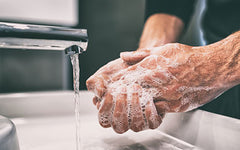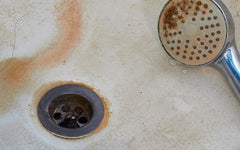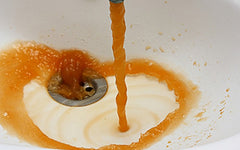Water is an essential part of life for drinking, cooking, cleaning, and bathing. But if your tap water smells like rotten eggs, how likely are you to grab a glass of ice water? It wouldn't be too refreshing, not because of the taste, but because of the potent smell coming from your glass. If you are dealing with the rotten egg smell in your home taps, we're here to help explain why this is happening and how you can find solutions.
Finding the Source Of The Odor
Before seeking out treatment options, it's essential to identify where your tap water is coming from, as there are different solutions for different sources. There are two primary sources of drinking water: ground and surface.
Groundwater is found in underground aquifers and is extracted using wells. Wells are more common in rural areas and are not regulated by the government.
Surface water is much more common and is used by major cities and municipalities. Familiar sources include lakes, rivers, and reservoirs, and while it's easier to obtain, it requires much more treatment to ensure it is safe.
Why Does My City Water Smell Like Rotten Eggs?
If you notice a musty smell of rotten eggs, sulfur, or rotten sewage coming from your taps, it's most likely an issue of bacterial growth.
Before panicking, make sure to rule out that the smell is coming from your tap, not your drain. Drains tend to develop a sewage-like stench when food waste, hair, soap, and other deposits build up on the drain walls.
To test this, pour a glass and take it away from the sink to take a whiff. If it doesn't smell, then you have a much easier task on your hands. Make sure to flush and clean your drains to remove the unpleasant smell.
If you still get a whiff of sulfur after isolating from the sink, it's time to take the next step to figure out the source of the issue.
Hot water heaters are also known to grow sulfur bacteria if the heater goes unused for a while or is turned off completely. Test both hot and cold taps separately. If the smell is only present when the hot tap is on, the issue is in the water heater. Often, the sulfur smell originates from the magnesium heating rod in the tank. Solving this problem is as easy as replacing the magnesium rod.
If none of these solutions fix the rotten egg odor, consider sending your water in for testing or contacting your local water department.
Why Does Well Water Smell Like Rotten Eggs?
Sulfur odor is much more common in groundwater; however, it rarely relates to quality or safety. Chances are, you are smelling an utterly natural occurrence of decaying earth. As the earth around the well or aquifer begins to decay, chemical reactions start to release hydrogen sulfide gas (H2S). Hydrogen sulfide can be present in natural instances as well as bacterial build-ups. In fact, this gas can also be produced in water heaters, as mentioned above. While sulfur bacteria is not harmful, hydrogen sulfide gas could pose a threat to humans at high levels. It is essential to properly vent the hydrogen sulfide, especially in basements and well pits. Aeration is a method that can help to reduce the hydrogen sulfide gas in a well. Aeration involves pumping air into a well to allow the gas to escape.
If these solutions didn't resolve the problem, you should get your water tested to make sure it is safe. While this type of odor is not likely to be harmful, it's best to get your well tested for other bacteria and chemicals like coliform bacteria and nitrate.
If tests show that your well is free of any harmful chemicals or bacteria, you probably still want to fix the offensive odor. If you've isolated the smell to the well, plumbing system, or water softener, the best solution is to disinfect the entire system with a chlorine solution. If your well is old, it will be difficult to remove the sulfur bacteria. It could become a complicated task and involve scrubbing the well casing with chemicals.
If disinfecting your well and plumbing and treatment components doesn't remove the earthy odors, the problem is most likely in the aquifer. At this point, a few options are remaining. Before drilling a new well, invest in treatment solutions like activated carbon filters to remove hydrogen sulfide gas.
Frequently Asked Questions
Q: Why does my hot water smell like rotten eggs?
A: If the smell is only coming from your hot tap, there's a very good chance the issue lies in the hot water heater. Many times, bacteria build-up forms on the magnesium heating rod, creating a sulfur smell. This fix could be as easy as replacing the heating rod.
Q: Is it safe to drink water that smells like rotten eggs?
A: This depends on the level of sulfur determined by testing. If the levels of sulfur are low, the water will rarely cause health issues. If sulfur levels are too high, stomach pain and nausea may occur. It's important to note that this smell can also be caused by harmful a contaminant like coliform or nitrates. Get your water tested today to avoid consuming unsafe chemicals and bacteria
Q: How do I remove sulfur from well water?
A: After determining the source of the strong aroma, there are several solutions to remove sulfates and hydrogen sulfide from the well system. Aeration, filtration, and chlorine solutions are the three best ways to treat your well and remove the sulfur smell.
The rotten egg smell is only the most common odor. Learn more about the different smells that water can have and what they mean.







